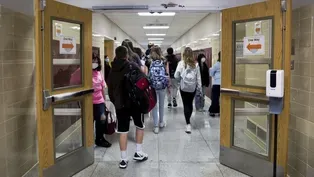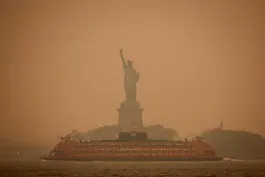
Escalating conflict in Congo fuels humanitarian crisis
Clip: 6/8/2024 | 7m 44sVideo has Closed Captions
Escalating conflict in Democratic Republic of Congo fuels growing humanitarian crisis
Years of violence between factions vying for control in the Democratic Republic of Congo have internally displaced 5.7 million people, according to the United Nations. Since 1996, fighting in the region has led to about 6 million deaths. Ali Rogin speaks with Tjada D'Oyen McKenna, CEO of Mercy Corps, to learn more about the conflict and the humanitarian situation on the ground.
Problems with Closed Captions? Closed Captioning Feedback
Problems with Closed Captions? Closed Captioning Feedback
Major corporate funding for the PBS News Hour is provided by BDO, BNSF, Consumer Cellular, American Cruise Lines, and Raymond James. Funding for the PBS NewsHour Weekend is provided by...

Escalating conflict in Congo fuels humanitarian crisis
Clip: 6/8/2024 | 7m 44sVideo has Closed Captions
Years of violence between factions vying for control in the Democratic Republic of Congo have internally displaced 5.7 million people, according to the United Nations. Since 1996, fighting in the region has led to about 6 million deaths. Ali Rogin speaks with Tjada D'Oyen McKenna, CEO of Mercy Corps, to learn more about the conflict and the humanitarian situation on the ground.
Problems with Closed Captions? Closed Captioning Feedback
How to Watch PBS News Hour
PBS News Hour is available to stream on pbs.org and the free PBS App, available on iPhone, Apple TV, Android TV, Android smartphones, Amazon Fire TV, Amazon Fire Tablet, Roku, Samsung Smart TV, and Vizio.
Providing Support for PBS.org
Learn Moreabout PBS online sponsorshipJOHN YANG: In the Democratic Republic of Congo, local officials say suspected Islamist rebels killed at least 38 people in an overnight attack in an Eastern village.
It's the latest in a spike of violent clashes that began in February.
Since 1996 fighting in the region has led to about 6 million deaths.
Ali Rogin has more.
ALI ROGIN: Two prominent rebel factions in the region are the March 23 Movement, or M23 and the so called Allied Democratic Forces or ADF, neighboring Rwanda has been accused of supporting M23 which the government denies.
And the ADF is a militia group affiliated with the Islamic State and are blamed for the latest attack.
They are just two of the more than 120 groups operating in the region, vying for interests, including control over the country's rich reserves of metals and rare minerals.
Civilians have been caught in the middle, and the Congolese government has often failed to protect them.
According to the United Nations, the violence has displaced 5.7 million people across the provinces of North Kivu, South Kivu and Ituri.
Tjada D'Oyen McKenna is the CEO of Mercy Corps, a nonprofit group providing humanitarian aid on the ground.
Tjada, thank you so much for being here.
This is an extremely complex conflict, but what are some of the root causes behind the violence that we're seeing now?
TJADA D'OYEN MCKENNA, CEO, Mercy Corps: The root causes you mentioned some of them this control.
This is a vastly mineral rich country in a lot of ways, so control of those illegal mining inter-ethnic groups, but also just lots of proxy wars between other actors, other countries, surrounding countries, ethnic groups.
At this point there have been so many splinterings of conflict groups that the numbers just ballooned to over 120 we believe.
ALI ROGIN: You just recently visited this region.
What is different about this conflict now?
Has it gotten worse?
TJADA D'OYEN MCKENNA: I recently was in Goma, which is the largest area in the north Cuba province.
And since January, over 700,000 more people have been displaced into Goma.
And what's particularly happening now is that the rebel groups have choked off all access to Goma, so they're surrounding areas 10 to 15 kilometers, just outside of the city, and they've choked it off so food prices have gone up.
It's made it hard for things to go in and out, and they are now that their weaponry has gotten so sophisticated that they're able to send bombs and other things into displacement camps where people that they've been displaced.
So it's just this real level of concentrated fear and threat that people are facing right now.
ALI ROGIN: What stuck out to you the most?
TJADA D'OYEN MCKENNA: The thing that stays in my mind as I talk to the people, and even as I talk to my own staff, as I mentioned, we've had staff, staff members are kind of they're subject to this violence.
They have family that are displaced.
It's just the incredible resilience of people.
I met a woman who's like sewing little doilies and table things and trying to sell her wares on the street.
Like people want better for their children.
They want to get back to normal, and they very much are talented and want to be able to live productive lives.
And just the incredible resilience of the people of the DRC really blows me away.
ALI ROGIN: And where are most of these people who have been displaced coming from?
Are they from internally are they from other country?
TJADA D'OYEN MCKENNA: It's almost it's almost all internally displaced people.
One of my colleagues said at one point he was hosting up to 50 relatives who had been displaced.
And so you'll often hear stories of people who've like moved.
They started with relatives, and they've moved to a camp, and there are campus full, and so now they're an area outside of a camp.
So it really is people just forced to flee their homes looking for a way to survive.
ALI ROGIN: I want to play a bit of sound from a mother of six who was displaced by the conflict.
AMINATHA KASOLE, Displaced Congolese Mother (through translator): Bombs are still falling in a camp here and in other camps, several people have died, and we live here with fear.
May God help us so that the war ends and people return to their respective areas.
ALI ROGIN: Can you tell us a little more about the conditions and the perils that people in these camps face?
TJADA D'OYEN MCKENNA: These are very crowded places, very little electricity, really tough access to water, clean hygiene, the poverty, just because people have now been forced from their livelihoods, also just makes people they're hungry.
They don't have access to running water.
It's not safe, and particularly women and children are feeling the brunt of being in these crowded conditions.
ALI ROGIN: Why is it that women and children are the most vulnerable here?
TJADA D'OYEN MCKENNA: Think this happens in situations of chaos, right?
You have a lot of people that are forced into very crowded, crowded situations amongst people that they may not know, women having to leave their homes for work and economic opportunities.
It's just very easy for them to take -- get taken advantage of in terms of gender and based violence, and they're really, you know, it's everyone, right?
It could be someone who is your neighbor in a displacement camp, or someone you go into the city to try to get work or try to get food, and unfortunately, they seem like easy targets.
And Tthey're just being really taken advantage of.
ALI ROGIN: At this point, do we know of -- have there been many reports of instances of violence?
TJADA D'OYEN MCKENNA: Yes, many.
And in fact, when you visit these areas, the women and the men are talking about it and talking about and I also, like in groups, you'll see women, really that are children or girls.
You'll see a lot of pregnant young people, and you know that that's what's happening, but they are actively talking about it and feeling just very vulnerable and very taken advantage of in this moment of time.
ALI ROGIN: And how about the Congolese government?
What has their role been, and how effective have they been in addressing the violence?
TJADA D'OYEN MCKENNA: The Congolese government has not been as effective as it should have been.
We desperately need them to come to the peace talks that are being organized through Angola in Luanda.
We definitely need them to come to some kind of ceasefire or truce with these rebel groups.
But clearly, the people we'd meet in the camps would say that they're not doing enough.
You know, as long as people are displaced and as vulnerable as they are and just feeling like they have nowhere to go, they're going to feel like the government's not doing enough.
ALI ROGIN: And there have -- there has been some political flux in recent months.
Has that affected the ability of the Congolese government to address this effectively?
TJADA D'OYEN MCKENNA: Certainly, obviously, like any instability does not help the situation at all, and so just it's another factor that is pulling at them and preventing people from really addressing what's going on.
ALI ROGIN: What fundamentally needs to change to stop this violence long term?
And what is the role of the international community?
What is the role of humanitarian organizations in achieving that?
TJADA D'OYEN MCKENNA: We need a real coming together of a peace process with pressure to bear on neighboring countries, all the parties to this war like really need to come together, and political and diplomatic pressure has to be put on everyone to do their part, to do this.
We also need to just help people in the humanitarian situations they're facing.
On top of all this violence, we've also we've also seen record rainfall in some areas, droughts and others, all related to climate related disasters.
So we need to get basic infrastructures back up and running help support people, but really this peace process so that people can return to their homes and have a chance of living productive lives.
ALI ROGIN: Tjada D'Oyen Mckenna, CEO of Mercy Corps, thank you so much for being here.
Thank you.
TJADA D'OYEN MCKENNA: Thank you for talking about this.
As temperatures rise, more schools struggle to beat the heat
Video has Closed Captions
As temperatures rise, schools without AC struggle to keep students healthy and learning (5m 26s)
The hazards of wildfire smoke, even hundreds of miles away
Video has Closed Captions
Wildfire smoke is hazardous even hundreds of miles away. Here’s how to protect your health (5m 22s)
Providing Support for PBS.org
Learn Moreabout PBS online sponsorshipSupport for PBS provided by:
Major corporate funding for the PBS News Hour is provided by BDO, BNSF, Consumer Cellular, American Cruise Lines, and Raymond James. Funding for the PBS NewsHour Weekend is provided by...













